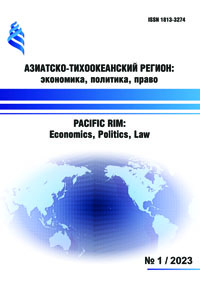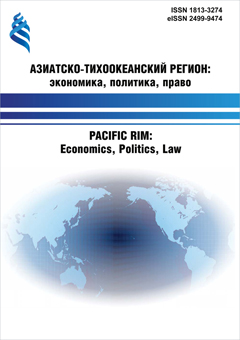COMPARATIVE LEGAL STUDY OF THE LEGAL REGIME OF UNMANNED VEHICLES IN THE ASIA-PACIFIC COUNTRIES: REGULATORY FEATURES IN RUSSIA, JAPAN, CHINA AND SINGAPORE
DOI:
https://doi.org/10.24866/1813-3274/2023-1/121-140Keywords:
unmanned vehicles, highly automated vehicles, artificial intelligence, autonomy, legal responsibility, legal regulation, Russia, Japan, China, SingaporeAbstract
The article analyzes the domestic and foreign experience of legal regulation in the field of the use of unmanned vehicles in the field of operation of motor transport and road traffic: the authors, for the purpose of comparative legal analysis, have studied the regulatory frameworks of Russia, as well as Asian technological leaders – Japan, China and Singapore. The authors believe that due to the active development of the digital space, as well as due to the fact that Russia's relations with the states of the AsiaPacific Region have noticeably intensified in many areas, the experience of the countries of the Asia-Pacific Region is of particular interest to Russia today – in terms of developing a regulatory framework that allows testing and commissioning unmanned vehicles. Based on the analysis of the legal regulation of the use of unmanned vehicles in Russia and abroad, the authors identify a number of trends observed in the formation of the regulatory database of states: 1) legal regulation options vary in the range from a complete prohibition of the use of unmanned vehicles to their free use on public roads, provided that a number of safety-related conditions are met; 2) there is a permanent adaptation of legislation in the field of the use of unmanned vehicles, depending on the gradual introduction of a higher level of autonomy into road traffic, which indicates the search for the most effective legal mechanisms by trial and error; 3) the harmonization of traffic rules for the changing conditions of the use of unmanned vehicles in the road sector; 4) there is a tendency to tighten control in the field of safety of the use of unmanned vehicles as significant risks of their use have been confirmed by practice; 5) the institution of legal responsibility is actively being modified due to the risk of accidents involving drones. As a result of the study, the authors have come to the conclusion that domestic legislation is in urgent need of operational adaptation to rapidly developing realities by making changes. The authors believe that these trends should be taken into account when developing domestic legislation in the field of the use of unmanned vehicles: a number of provisions of the normative acts of the countries considered in the work can be implemented into the legislation of Russia in order to develop an optimal model of legal regulation of the scope of application of unmanned vehicles.



